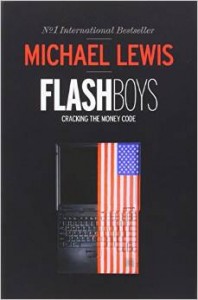 What on earth is “the stock market?” It is something in which I have participated for almost 60 years, first as a most modest buyer of stocks, then through the investments of growing pension and profit-sharing funds, and finally, today, trying to stretch my dwindling IRA to cover our modest expenses as my wife and I enter our eightieth years. Throughout this time I’ve maintained a trust that the “market system” is reasonably fair.
What on earth is “the stock market?” It is something in which I have participated for almost 60 years, first as a most modest buyer of stocks, then through the investments of growing pension and profit-sharing funds, and finally, today, trying to stretch my dwindling IRA to cover our modest expenses as my wife and I enter our eightieth years. Throughout this time I’ve maintained a trust that the “market system” is reasonably fair.
Michael Lewis pops that balloon. In his mesmerizing story of high frequency trading on the world’s stock markets, but especially in the U. S., we learn that customers are “prey,” that “people are getting screwed because they can’t imagine a microsecond” (a millionth of a second), that “moral inertia” is the dominant trait, and that “ the entire history of Wall Street was the story of scandals.”
And yet, what the so-called high-speed traders were (and are) doing is “riskless, larcenous, and legal.” The story seems to be the result of “human nature and the power of incentives,” plus the incredible complexity of today’s markets, a complexity whose outcomes are totally unpredictable — witness the recent series of “flash sales” in which markets drop precipitously and then recover, all within moments.
And how do the brokers, banks and traders respond, other than in their natural, self-admiring language? They have learned the “art of torturing data” to try and persuade their customers they are entirely honest! Lewis’s conclusion … “the stock market at bottom is rigged!”
But where on earth can we safely invest our funds? My mattress is already stuffed!

About the author: Felix Kloman is a sailor, rower, husband, father, grandfather, retired management consultant and, above all, a curious reader and writer. He’s explored how we as human beings and organizations respond to ever-present uncertainty in two books, ‘Mumpsimus Revisited’ (2005) and ‘The Fantods of Risk’ (2008). A 20-year resident of Lyme, he now writes book reviews, mostly of non-fiction that explores our minds, our behavior, our politics and our history. But he does throw in a novel here and there. For more than 50 years, he’s put together the 17 syllables that comprise haiku, the traditional Japanese poetry, and now serves as the self-appointed “poet laureate” of Ashlawn Farms Coffee, where he may be seen on Friday mornings. His wife, Ann, is also a writer, but of mystery novels, all of which begin in a bubbling village in midcoast Maine, strangely reminiscent of the town she and her husband visit every summer.